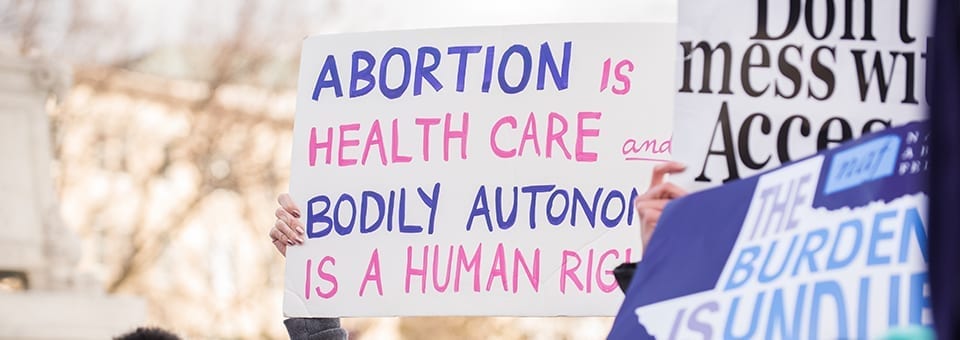Center for Reproductive Rights, Planned Parenthood File New Lawsuit Challenging Texas Measure Banning The Safest, Most Common Method of Abortion in the Second Trimester
Dangerous law puts medical decisions in the hands of politicians — rather than doctors and their patients. Texas faces a multimillion dollar legal bill from Center for Reproductive Rights for advancing unconstitutional abortion restrictions struck down b
(PRESS RELEASE) The Center for Reproductive Rights and Planned Parenthood filed a new lawsuit in federal district court today challenging a Texas measure that bans the safest and most common method of ending a pregnancy in the second trimester after 15 weeks of pregnancy. This law is part of a coordinated national strategy by anti-abortion politicians, who’ve passed more than 330 restrictions on abortion at the state level since 2010. Today’s filing comes a little over a year since the U.S. Supreme Court struck down Texas’s clinic shutdown law in Whole Woman’s Health v. Hellerstedt in a challenge brought by the Center for Reproductive Rights. The state of Texas is currently facing a $4.8 million dollar fee request from the Center for its court battle in Whole Woman’s Health.
Today’s filing also comes two days after the Texas Legislature convened a special session where they will once again consider measures to further restrict a woman’s right to safe, legal abortion and cut off access to preventive care at Planned Parenthood.
The ban is slated to take effect on Sept. 1, 2017. Said Nancy Northup, president and CEO of the Center for Reproductive Rights: “Texas lawmakers have once again compromised the health and safety of the women they were elected to represent in order to cater to anti-choice special interests and their extremist agenda. “The U.S. Supreme Court has held time and again that women have a fundamental right to access safe, legal abortion, and last year’s historic Whole Woman’s Health decision affirmed that the constitution provides strong protections against interference from legislators who put politics above public health and common sense. “The law we challenged today in Texas is part of a nationwide scheme to undermine these constitutional rights and ban abortion one restriction at a time. We are prepared to fight back using the power of the law wherever politicians compromise a woman’s ability to receive the care she needs.” The ban is part of SB8—the most sweeping anti-abortion bill to pass in the nation this year. The measure—which was signed by Governor Gregg Abbott last month–also doubles down on regulations finalized by the Texas Department of State Health Services (DSHS) in 2016 forcing the burial or cremation of embryonic and fetal tissue when a woman has a miscarriage management procedure, ectopic pregnancy surgery, or an abortion—regardless of her personal wishes, religious beliefs, or values. The Center for Reproductive Rights filed a challenge to the regulations in December 2016 and a district court blocked the regulations from taking effect in late January. The Center is currently requesting that the same federal district court allow the plaintiffs to add a challenge to the burial or cremation requirements included in SB8 as part the ongoing litigation.
Said Amy Hagstrom Miller, founder, president, and CEO of Whole Woman’s Health:
“Access to quality abortion care is a human rights issue. Texans deserve the dignity and respect of full access to reproductive healthcare, including abortion care that’s guaranteed by our constitution and was reaffirmed by the Supreme Court in the Whole Woman’s Health decision last summer. “This latest attack on abortion care in Texas with the passing of SB8, which bans D&,E procedures, is an attempt to ban abortion and is evidence that politicians will stop at nothing in their crusade to make abortion out of reach for Texans. “Whole Woman’s Health is honored to lead another fight in the courts on behalf of our patients and Texans in order to preserve safe abortion care for all.” Seven other states in addition to Texas have passed similar bans. Laws in Louisiana, Kansas and Oklahoma have not taken effect due to challenges brought by the Center for Reproductive Rights. The ACLU has also successfully blocked a similar ban in Alabama and the ACLU and the Center are also challenging a nearly identical ban in Arkansas.
Major mainstream medical experts like the American Congress of Obstetricians and Gynecologists oppose this type of ban, noting “these restrictions represent legislative interference at its worst: doctors will be forced, by ill-advised, unscientifically motivated policy, to provide lesser care to patients. This is unacceptable.” Said Dr. Raegan McDonald-Mosley, chief medical officer at Planned Parenthood Federation of America:
“This dangerous law puts medical decisions in the hands of politicians, rather than doctors, –threatening women’s safety, and punishing physicians for using their best medical judgement. This is yet another attempt by politicians to ban abortion step by step and method by method, regardless of how many women they hurt. For too many women today, the legal right to abortion does not translate into access, especially for young people, women of color, those who live in rural areas, and people with low incomes. We will continue to fight for every person’s right to pursue the life they want, including the right to end a pregnancy.”
Today’s challenge was filed by Janet Crepps and Molly Duane of the Center for Reproductive Rights, Melissa Cohen of Planned Parenthood Federation of America, Austin attorney Patrick O’Connell and J. Alexander Lawrence of the law firm Morrison &, Foerster in the U.S. District Court for the Western District of Texas on behalf of Whole Woman’s Health, Planned Parenthood Center for Choice, Planned Parenthood of Greater Texas Surgical Health Services, Planned Parenthood South Texas Surgical Center, Alamo Women’s Reproductive Services, Southwestern Women’s Surgery Center, Reproductive Services, and several individual physicians.
###

